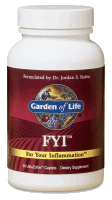Inflammation: The Secret Leading Cause of Disease and What to Do About It
by SixWise.com
Inflammation is your body's natural response to outside invaders
it perceives as threats. Specifically, it's a process in which
your body's white blood cells protect you from foreign substances
such as bacteria and viruses.
However, when your body is in a chronic state of inflammation,
the inflammation can lodge in your muscles, joints and tissues.
In fact, chronic inflammation is a leading cause of many diseases,
both physical and neurological, including heart disease.
What Causes Inflammation?
Many factors, including emotions, diet and lifestyle, contribute
to inflammation. Diet is a big one. Foods are naturally pro-inflammatory
or anti-inflammatory, so depending on what you eat you may
be fueling inflammation in your body.
|

Sugary, highly processed foods rank high on the list
of "pro-inflammatory" foods.
|
Pro-inflammatory foods include sugar, soda, alcohol, bread
and red meat (how many of these do you eat or drink?). Trans
fats, which are found in many snack foods, fried foods, crackers,
candies, baked goods, cookies, vegetable shortening, some
margarines, salad dressings and many processed foods, are
particularly problematic. Studies have found that eating trans
fats increases systemic inflammation, which is a risk factor
for heart disease.
A study in the December 2004 issue of the American Journal
of Clinical Nutrition looked at a similar issue: The effect
of trans fats on inflammation and heart disease in people
who already have heart disease. According to the study authors,
"Our results suggest that TFA [trans fatty acids] are
strongly associated with systemic inflammation in patients
with chronic heart failure. This finding suggests a novel
potential mechanism whereby TFA intake may affect the health
of patients with established heart disease."
As for foods that are anti-inflammatory, these include-you
guessed it-fruits and vegetables.
Other factors that can increase your risk of chronic inflammation
include:
-
Being obese or overweight
-
Eating a poor diet
-
An existing heart condition
-
A family history of heart disease
-
Diabetes that's poorly controlled
-
A sedentary lifestyle (no, or very little, exercise)
-
Smoking
-
Long-term infections
-
Gum disease
-
Stress
How do You Know if You Have Chronic Inflammation?
There are several tests you can take to determine the level
of inflammation in your body. One such test is a C-reactive
protein (CRP) blood test, which may be covered by insurance
and can be done along with a cholesterol test. CRP level is
used as a marker of inflammation in the arteries. (A CRP level
under 1.0 milligrams per liter of blood means you have a low
risk for cardiovascular disease, 1.0 to 2.9 milligrams means
your risk is intermediate and more than 3.0 milligrams is
high risk.)
Another test that's often covered by insurance is a fasting
blood insulin level. This test is used to screen for diabetes
and heart disease, but it's also a marker for inflammation.
The higher your insulin levels are, the more inflammation
your body is producing,
Is Inflammation Serious?
Inflammation is associated with a host of diseases like crohn's
disease, colitis and arthritis, and many of them are life
threatening. Said pathologist Ed Friedlander, M.D., "Probably
your own death will be caused by your last inflammatory response
... Whole body inflammation, formerly a popular term used
especially by surgeons for the patients who they could not
save, is going out of fashion in favor of multiple organ failure."
Here's a brief list of how chronic inflammation can affect
your organs:
-
Inflammation of the heart (myocarditis): Shortness of
breath or fluid retention
-
Inflammation of the small tubes that transport air to
the lungs: Asthma attack
-
Inflammation of the kidneys (nephritis): High blood pressure
or kidney failure
-
Inflammation of the large intestine (colitis): Cramps
and diarrhea
How to Reduce Inflammation in Your Body
One of the safest, low-risk things you can do is to modify
your lifestyle and dietary choices. This means eating a variety
of anti-inflammatory foods, limiting or avoiding all together
the pro-inflammatory foods, exercising and quitting smoking
(if you do). This gives you only room for positive side effects.
|
Garden of Life's "For Your Inflammation"
-
 A
TOP recommendation to anyone prone to inflammation A
TOP recommendation to anyone prone to inflammation
-
All-natural, safe and clinically proven to reduce
the effects of inflammation
-
Supports joint integrity with collagen-stabilizing
building blocks that promote joint lubrication to
lessen friction.
-
Provides vital amino acids that assist in the production
of collagen.
-
Reduces acidity that can lead to inflammation.
-
Supports immune function, which can prevent the
body from attacking its own tissues.
-
Enhances enzymatic activity to cleanse the blood
of toxic proteins that exacerbate an overactive
immune system.
-
Reduces oxidative stress by helping to destroy
harmful free radicals.
-
Available now for 30% off its regular retail price!
Read
More and Order Now!
|
On the other hand, the conventional methods to treat inflammation
are high in risk. These would include medications like COX-2
inhibitors, which have been highlighted in the media lately
because of their link to heart problems. One such drug is
the popular anti-inflammatory medication Vioxx. Vioxx
was pulled from the market in September 2004 after a study
showed that patients taking the drug faced twice the risk
of heart attack. Other anti-inflammatory meds like Bextra,
Celebrex and even over-the-counter Aleve, have also been linked
to increased heart attacks and stroke.
Fortunately, there are safe alternatives to COX-2 inhibitors.
Garden
of Life's For Your Inflammation (FYI) formula is a synergistically
balanced whole food, herbal and enzyme blend that is clinically
proven to reduce the effects of inflammation. It was
formulated to provide the body with the building blocks needed
to rebuild and support healthy cartilage and connective tissue,
as well as to control and prevent inflammation throughout
the body. For Your Inflammation:
-
Supports joint integrity with collagen-stabilizing building
blocks that promote joint lubrication to lessen friction.
-
Provides vital amino acids that assist in the production
of collagen.
-
Reduces acidity that can lead to inflammation.
-
Supports immune function, which can prevent the body
from attacking its own tissues.
-
Enhances enzymatic activity to cleanse the blood of toxic
proteins that exacerbate an overactive immune system.
-
Reduces oxidative stress by helping to destroy harmful
free radicals.
Best of all, it contains herbs that may slow the COX-2 inflammation
process by inhibiting the enzymes that produce pain, and it
may be used safely everyday with no known side effects.
Sources
Inflammation
& You
Trans
Fats Associated with Systemic Inflammation in Patients with
Heart Disease
Tests
for Inflammation
What
You Need to Know About Inflammation
Inflammation
and Repair
Tart
Cherries--Natural Cox-2 Inhibitors